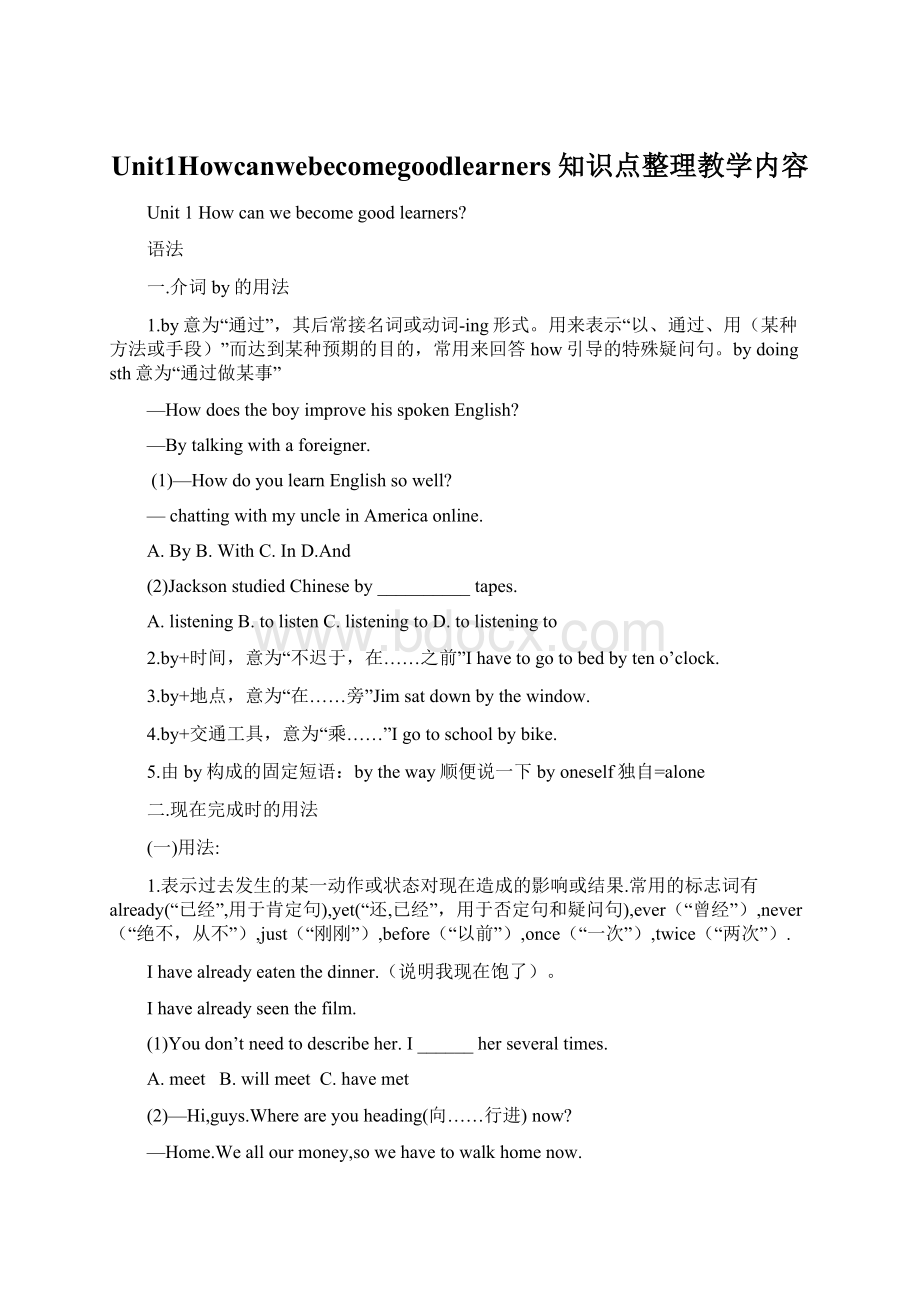Unit1Howcanwebecomegoodlearners知识点整理教学内容.docx
《Unit1Howcanwebecomegoodlearners知识点整理教学内容.docx》由会员分享,可在线阅读,更多相关《Unit1Howcanwebecomegoodlearners知识点整理教学内容.docx(16页珍藏版)》请在冰豆网上搜索。

Unit1Howcanwebecomegoodlearners知识点整理教学内容
Unit1Howcanwebecomegoodlearners?
语法
一.介词by的用法
1.by意为“通过”,其后常接名词或动词-ing形式。
用来表示“以、通过、用(某种方法或手段)”而达到某种预期的目的,常用来回答how引导的特殊疑问句。
bydoingsth意为“通过做某事”
—HowdoestheboyimprovehisspokenEnglish?
—Bytalkingwithaforeigner.
(1)—HowdoyoulearnEnglishsowell?
—chattingwithmyuncleinAmericaonline.
A.ByB.WithC.InD.And
(2)JacksonstudiedChineseby__________tapes.
A.listeningB.tolistenC.listeningtoD.tolisteningto
2.by+时间,意为“不迟于,在……之前”Ihavetogotobedbyteno’clock.
3.by+地点,意为“在……旁”Jimsatdownbythewindow.
4.by+交通工具,意为“乘……”Igotoschoolbybike.
5.由by构成的固定短语:
bytheway顺便说一下byoneself独自=alone
二.现在完成时的用法
(一)用法:
1.表示过去发生的某一动作或状态对现在造成的影响或结果.常用的标志词有already(“已经”,用于肯定句),yet(“还,已经”,用于否定句和疑问句),ever(“曾经”),never(“绝不,从不”),just(“刚刚”),before(“以前”),once(“一次”),twice(“两次”).
Ihavealreadyeatenthedinner.(说明我现在饱了)。
Ihavealreadyseenthefilm.
(1)Youdon’tneedtodescribeher.I______herseveraltimes.
A.meetB.willmeetC.havemet
(2)—Hi,guys.Whereareyouheading(向……行进)now?
—Home.Weallourmoney,sowehavetowalkhomenow.
A.spendB.spentC.havespentD.arespending
(3)Haveyoueverseenhim________?
A.agoB.twodaysagoC.beforeD.justnow
2.表示过去发生的某一动作或状态,一直持续到现在。
经常与时间状语for+时间段,since+时间点或一般过去时从句,如:
forfiveminutes(5分钟)
since1985(自从1985年一直到现在).sincehewasfiveyearsold(自从他是五岁的时候一直到现在)
现在完成时的标志语还有sofar“到目前为止”
注意:
此时谓语动词要用延续性动词,若是非延续性动词要变成延续性动词。
leave-beawayborrow-keepbuy-havebegin-beondie-bedead
join-beamemberofgo/come-beinopen-beopenbecome-be
Ihavewaitedforyouforthreehours.我一直等你等了三个小时。
Hehasbeenawayforamonth.他已经离开一个月了。
(hasbeenaway不能用hasleft)
Herbrotherhasbeenamemberofarmyforthreeyears.(hasbeenamemberofarmy不能用hasjoinedarmy)
HanMeihaskeptthebooksincelastweek.(haskept不能用hasborrowed)
(1)Imyhometownforalongtime.Ireallymissit.
A.leftB.wentawayfromC.haveleftD.havebeenawayfrom
(2)—HowdoyoulikeyourEnglishteacher?
—Heisgreat.Wealllovehim.Wefriendssincethreeyearsago.
A.wereB.havemadeC.havebeenD.havebecome
(3)—Anna,youChineseisgood.haveyoubeeninChina?
—SinceIwasten.
A.HowlongB.HowfarC.HowoftenD.Howsoon
(4)Hasthemoviebegun?
Yes,it____forfiveminutes.
A.hasbegunB.beganC.hasbeenon
(二)现在完成时的肯定句,否定句和疑问句的构成
1.现在完成时的肯定句的构成是:
主语+have/has+动词过去分词+其他.(have用于各种人称,has用于第三人称单数)
Hehasalreadypostedtheletter.(他已经寄了那封信)
2.现在完成时的否定句的构成是:
主语+have/has+not+动词过去分词+其他.
Hehasn’tpostedtheletteryet.他还没有寄那封信(注意:
否定句中要把already变成yet)
3.现在完成时的一般疑问句的构成是:
Have/Has+主语+动词过去分词+其他.
肯定回答是Yes,主语+have/has否定回答是No,主语+haven’t/hasn’t
Hashepostedtheletteryet?
Yes,hehas/No,hehasn’t
(三)have/hasgoneto与have/hasbeento的区别
1.have/hasgoneto意为“已经去……地方了(还没回来,不在说话人所在的地方)”
—WhereisLiLei?
—Hehasgonetoschool.
2.have/hasbeento意为“曾经去过……地方(已回来)
—Wherehaveyoubeen?
—Ihavebeentothelibrary.
(1)Sheisn’tatthecinemanowbecauseshethelibrary.
A.hasbeentoB.havebeentoC.hasgonetoD.havegoneto
(2)—IthinkthemanovertheremustbeBob.
—Itbehim.HehastoAustralia.
A.can’t;goneB.can’t;beenC.maynot;beenD.mustn’t;gone
(3)—HaveyoueverbeentoCanada?
—Yes,Itherelastyearwithmyparents.
A.havebeenB.havegoneC.wentD.go
(4)—WhereisJhon?
—He___thesupermarket.
A.hasgonetoB.hasbeentoC.hasgone
SectionA
1.askforsth索要某物asksbforsth“向某人索要某物”
Heaskedhismotherforsomemoney.
(1)Healwaysasksmeadvicewhateverhedoes.
A.forB.on C.of
(2)Shewrotetoherfriendandinformationaboutcomputerprogramming.
A.askedfor B.wentforC.caredfor D.paidfor
2.thewaytodosth=thewayofdoingsth.“做某事的方法”
3.区分watch,see,read和look
(1)watch强调看正在运动或变化的事物。
多指看电视、录像、比赛、表演等。
(2)see用于看电影,Wesawawonderfulfilmyesterday.
另外see侧重于结果,指“看见,看到”Canyouseethebirdinthetree?
(3)read意为“看”时,指“阅读;朗读”,后面接书、报纸、杂志等。
Helikesreadingstorybooks.
(4)look强调“看”的过程,后面接宾语,则用lookat.
Lookattheblackboard,please.
Look!
Theboyiswatchingthefootballgame.Hisfatherisseeingafilm,andhismotherisreadinganewspaper.
(1)Jimhasmanybooks.Helikesthemverymuch.
A.readingB.seeingC.lookingD.watching
(2)!
YaoMingisinthebasketballgame.Let’sit.
A.Look;lookB.Watch;watchC.Look;watchD.Watch;look
4.haveconversationswithsb.“和某人交谈”
Hehadconversationswithhissonyesterday.
5.Whatabout…?
=Howabout…?
意为“……怎么样”或“……好不好?
”接代词宾格或动词-ing。
Ithinkthisisagoodidea.Whataboutyou?
WhataboutvisitingtheEastLake?
—Wedon’thavemuchhomeworkthisweekend.Canwegoouttogether?
—OK.Whataboutamovie?
A.toseeB.seeingC.seeD.sees
6.aloud“大声地,出声地”readaloud朗读
loudly“大声地,吵闹地”,强调声音喧闹,不悦耳。
Theboysaretalking____intheclassanditmakestheteacherunhappy.
A.aloudB.loudlyC.louderD.loud
7.在英语中,可以用动词不定式形式表示目的.译为“为了”。
Wehavetostudyhardtofindagoodjob.
(1)toschoolontime,Ineedtogetupat6:
00am.
A.GetsB.GettingC.TogetD.get
(2)Howkindyouare!
Youalwaysdowhatyoucanothers.
A.helpB.helpingC.helpsD.tohelp
8.practicedoingsth.“练习做某事”
WeshouldpracticeEnglishasmuchaspossible.
A.speakB.speakingC.tospeakD.speakin
9.thatway=inthatway用那种方法thisway=inthisway用这种方法
FinallyIfoundmyunclethatway.
10.It+is+形容词+(for/ofsb)todosth.意为“做某事对于某人来说是……的”在此句型中,it是形式主语,真正的主语是todosth。
当形容词是描述人的性格、品质的词如kind,nice,clever,foolish时用ofsb,其他大多都用forsb.
Itwasverydifficultformetofinishtheworkontime.
It’skindofyoutotellmethat.
It’spoliteforstudentshellototeachers.
A.tosayB.sayingC.saysD.say
11.alittle=abit=alittlebit=kindof意为“一点儿;少许”都可以用来修饰形容词/副词。
alittlebitquiet.此外,alittle还可以直接修饰不可数名词,而abit须和of连用才可以修饰不可数名词。
Theweatherhereisalittlebithot.alittlewater=abitofwater一点儿水
—Whatisyournewfriendlike?
—Sheisshy..
A.abitofB.alotofC.alittlebitD.akindof
12.Whydon’tyoudosth?
或Whynotdosth?
意为“你为什么不做某事呢?
”
Whydon’tyoubuyyourmothersomeflowers?
=Whynotbuyyourmothersomeflowers?
13.finishdoingsth“完成做某事”
Haveyoufinishedcooking?
Whynotyourteacherforhelpwhenyoucan’tfinishthestorybyyourself.
A.toask;writeB.toask;writingC.ask;writingD.asking;towrite.
14.常见的系动词可简记为:
一是be(am,is,are,was,were,)二是感觉feel,三是保持keep,stay,四是变become,get,turn,五是起来taste尝起来,smell闻起来,look看起来,sound听起来,feel摸起来后跟形容词作表语。
(1)Ifeeltoseethatmyhometownisbecomingmoreandmorebeautiful.
A.proudB.angryC.upsetD.lonely
(2)Thecookiesgood.CouldIhavesomemore?
A.tasteB.smellC.feelD.sound
(3)Whatisthematterwithyou?
Yousosad.
A.lookB.seemtohaveC.looklikeD.seemlike
15.祈使句的用法:
祈使句表示请求、命令、劝说、号召、警告等意思。
(1)肯定的祈使句:
以动词原形开头,动词原形前可以加Please,please也可放在句末。
Comeandhavefun.
(2)否定的祈使句:
“Don’t+动词原形+其他”Don’tsmokehere!
(1)____late.It’syourfirstdaytowork.
A.Don’ttobeB.Don’tbeC.Don’tD.No
(2)drawonthewall.
A.NotB.NoC.Doesn’tD.Don’t
16.祈使句在表示禁止时,可与含有mustn’t的句子互换
Don’tsmokehere.=Youmustn’tsmokehere.
17.记住两个表示“首先”的词:
atfirst,firstofall
(1)atfirst的意思是“起初,开始”,暗示后来的情况有所变化。
其反义词组是atlast意为“最后,终于”
AtfirstIdidn’twanttogo,butIsoonchangedmymind.
(2)firstofall的意思是“首先,第一”,相当于first,表示顺序,是时间上或一系列行为动作的开始,后面往往接next,then等。
Firstofall,openthewindows,thenturnoffthegas,andifnecessary,callanambulance(救护车).
(1)Ifwewanttoworkforourcountryinthefuture,weshouldhavestrongbodyandrichknowledge.
A.atfirstB.firstofallC.forthefirsttimeD.afterall
(2),theInternetwasonlyusedbythegovernment.Butnowit’swidelyusedineveryfield.
A.AsusualB.AtfirstC.AfterallD.Sofar.
18.trytodosth“试图做某事,尽力做某事”
Shetriedtocarrythebasket.
19.bepatientwithsb.“对某人有耐心”
Youshouldlearnhowtobepatient.
20.“the+比较级+主语+谓语,the+比较级+主语+谓语”意为“越……,就越……”
Thebusiersheis,thehappiershefeels.
Themoreyousmile,theyouwillfeel.
A.happyB.happierC.happilyD.morehappily
21.find+it+形容词+(forsb)todosth意为“发现做某事对某人来说什么样的”it是形式宾语,todosth是真正的宾语
Ifounditverydifficulttolearnhowtodrive.
(1)Wefindnecessarytoprotecttheearth.
A.itB.thisC.thatD.what
(2)MypenpalfounditdifficultChinesewell.
A.learningB.learnC.tolearnD.learned
22.thesecretto……的秘诀。
theanswertothequestion问题的答案
thekeytothebike自行车钥匙
23.so…that…“如此……以致于……”so意为“如此”,后接形容词或副词,that意为“以致于”,后接句子。
so…that…常和not…enoughto及too…to…进行同义句转换
Heistooyoungtogotoschool.=Heisn’toldenoughtogotoschool.=Heissoyoungthathecan’tgotoschool.
(1)Theproblemistoodifficultformetoworkout.(改为同义句)
Theproblemisn’tformetoworkout.
(2)Shewasangryshewalkedoutandclosedthedoorheavily.
A.so;thatB.too;andC.very;thatD.such;that
24.
(1)beafraidtodosth=beafraidofdoingsth.意为“害怕做某事”
(2)beafraidofsth意为“害怕某物”Sheisafraidofthedog.
(1)I’mafraidoutatnightalone.
A.goB.goingC.togoD.goes
(2)Thestudentis________seetheteacherbecausehe_______amistake.
A.afraidof;hasB.afraidto;hasmade
C.afraidto;makeD.afraidof;made
25.区分becauseof和because
(1)becauseof其后不接句子。
Wedidn’tgofishingyesterdaybecauseoftheheavyrain.
(2)because其后接句子.Heislateforshoolbecausehegetsuplate
(1)LiuXianghadtogiveuptheracehisfoot.
A.becauseofB.becauseC.thoughD.evenif
(2)Marydidn'tgettothepartyyesterday________shedidn'tfeelwell.
A.ifB.becauseC.butD.until
26.过去分词短语可作后置定语,意为“被……的”。
ThenovelswrittenbyLuXunareveryeducational.
aboycalled/namedLiLei一个被称作李雷的男孩
27.fallinlovewith意为“爱上(某人或某物)”
Theyfellinlovewitheachotherafterworkingtogetherformanyyears.
28.区分exciting和excited
(1)exciting意为“令人兴奋的”,修饰物。
Hetoldmetheexcitingnews.Thestoryisexciting.
(2)excited意为“感到兴奋的”,修饰人。
Whatare